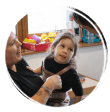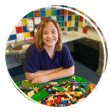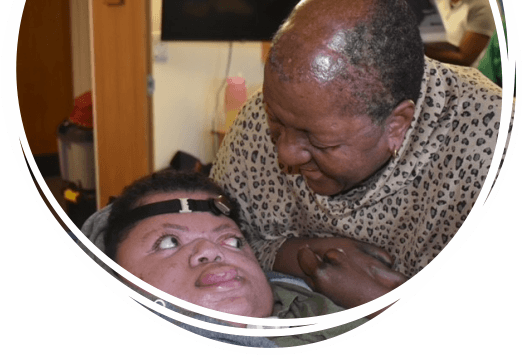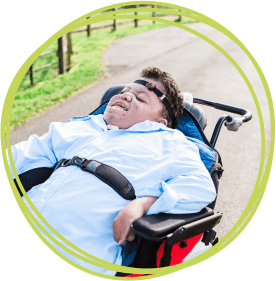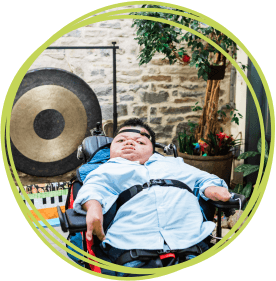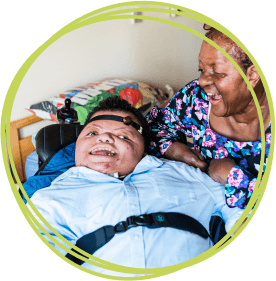
When Kaddy became pregnant she knew there was a chance her child would have the rare bone syndrome which she lives with.
Kaddy has Apert Syndrome, a condition which causes the fusion of bones, which affects her skull, hands and feet.
“When I fell pregnant with Elijah the genetic consultant told me there was a 50/50 chance that my child would have it too, but Elijah was my baby and I loved him already. Him potentially inheriting Apert Syndrome didn’t change that.”
Elijah was born in March 2006 where it was confirmed he too had Apert Syndrome along with a cleft of the soft palette and a heart murmur.
Kaddy and her new born were monitored at Birmingham Women’s Hospital before the pair were allowed home. Elijah had surgery at just six months old to separate his first finger and thumb. This was followed by an MRI on his skull which showed it was tight around his brain.
The following May, Elijah underwent major surgery which saw his skull cut from ear to ear and metal rods inserted. The rods were turned twice a day for several months to expand his skull and relieve the pressure on his brain.
In September of the same year, Elijah returned to hospital to have the rods removed and he was discharged the following day.
Following the surgery, Kaddy became concerned there had been a leak of cerebral fluid and rushed Elijah back to hospital.
“For two weeks after the surgery I was back and forth to the hospital with concerns about Elijah’s condition,” said Kaddy.
Elijah’s condition worsened and he was readmitted to hospital, where surgery was carried out to re-open his skull. It was then discovered that Elijah had suffered major damage to his brain.
“The brain had become exposed and Elijah suffered a catastrophic brain injury," said Kaddy.
I struggled to recognise the child in front of me.
“Before, Elijah was feeding and crawling around and babbling away happily. Now he was motionless, just lying there, unable to interact with me like he once did.”
Elijah, who relies on a wheelchair and cannot move independently, spent the next 10 months in Birmingham Children’s Hospital. Kaddy, who was bought up in care due to her mother being unable to cope, was determined to fight for Elijah.
It was New Year’s Eve in 2007 and I sat there and thought, ‘I need to do something’. So I grabbed my laptop and started to look at therapies and rehabilitation centres for children like Elijah.
Kaddy managed to secure Elijah rehabilitation for his brain injury with the Children’s Trust, moving from Birmingham to a unit in Surrey in August 2008. After nearly 18 months of treatment Kaddy and Elijah moved again and decided to settle in Clevedon.
Elijah then started to have seizures with Kaddy asking health professionals for additional support to help her care for her child.
It was at that point, Elijah, then 3, was referred to Charlton Farm children’s hospice.
When I first visited Charlton Farm with Elijah, I pretty much cried all the way round. I felt so much relief that someone was here to help and support us. The team here have been a constant lifeline for us.
“They have been there to support us through every step of the journey, been there for me to call and share my sadness and frustration and always there to offer reassurance and advice.”
The hospice has supported Elijah, who turned 18 in March, throughout his journey from child into adulthood.
“Charlton Farm has been part of our lives for pretty much all of Elijah’s life.”
Kaddy, who cares for Elijah at home with a care of 24/7 carers, said her son loves his time at Charlton Farm.
“He’s a bright young man with a dry sense of humour,” she said.
“He loves Marvel and a wide range of music and although he is non-verbal he communicates through eye gaze and facial expressions.
“He loves interacting with the other families when we are at Charlton Farm and enjoys spending time in the hydrotherapy pool.
“Elijah has had so many challenges in his life, but he’s a determined young man, always fighting back against whatever life throws at him.”
For Kaddy, her time at Charlton Farm gives her space to relax.
At home I am with people 24/7 as there is always a care team with Elijah. Coming to Charlton Farm gives me a chance to relax, be calm and empty my brain.
“It’s such a calming environment where I can completely decompress. I don’t have to think about cooking, medication, assisting carers or anything. Everything is taken care of.”
As well as caring for Elijah with a team of carers at their seaside home, Kaddy – a former support worker at a homeless charity - also runs the charity Carer’s Collective and community interest company Elijah’s Hope.
The Carer’s Collective supports carers and helps them navigate issues surrounding looking after a loved one, from accessing benefits to giving advice on recruiting and employing carers.
“The organisation aims to support carers who have, like myself, struggled to access support for themselves and consequentially find themselves burnt out by the responsibility,” said Kaddy.
“Carer’s Collective was born out of my own experiences – my realisation that while there is a real focus on support for those needing care, often the ones providing that care and particularly the unpaid carers such as family, are left to fend for themselves.”
Kaddy is also now an Apert Syndrome expert and CEO and founder of Elijah’s Hope CIC - a non-profit organisation that supports children and families with Apert Syndrome. The organisation supports people and families affected by Apert Syndrome via an online community of blogs, social media, resources and signposting people to the services available.
Now Elijah is 18, he will now move into adult care.
“I don’t know what we will do without Charlton Farm. Elijah has known it all of his childhood,” said Kaddy.
Kaddy is determined not to be a stranger to charity which has become a key part of her family’s life. She plans to hold a fundraising event and hopes to become a guide to help with tours of the hospice.
Charlton Farm has always been there for us, and I want to now be there for it, I want to give back to a place that has given us so much.


